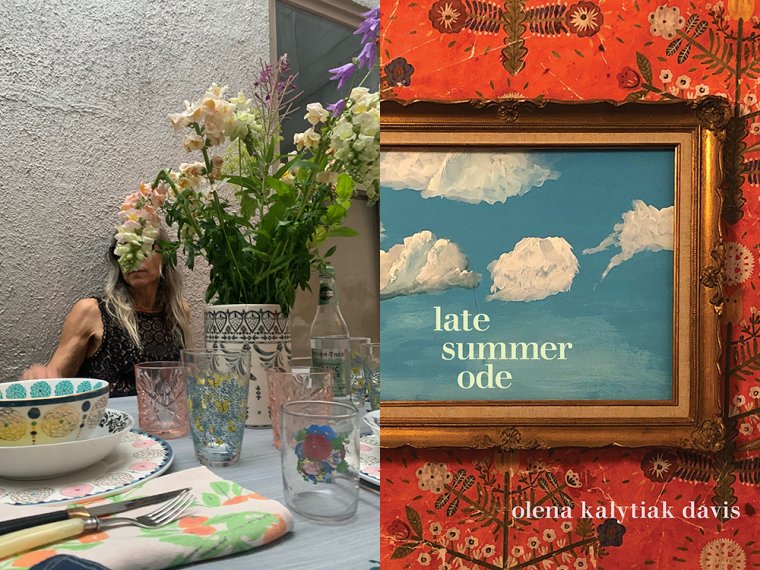This week’s installment of Ten Questions feaures Olena Kalytiak Davis, whose fourth poetry collection, Late Summer Ode, is out today from Copper Canyon Press. In playful free-verse lyrics, sonnets, and a short story, Davis inventories the abundance found in the liminal space between seasons, perspectives, and ways of being in the world. The poems teem with colorful flora and fauna, which crop up beside the more sterile objects of modern domesticity and the professional sphere, poking fun at the romantic impulse as it emerges within late capitalism: In “Little Outdoor Poem,” for example, the speaker sits outside “after text- / arguing with my kids / about not taking care / of emily dickinson,” contemplating “warm nights! warm nights! / the neighbor’s too loud / but pretty decent music / refinancing / the encroaching blue / magnolia.” The book also functions as a yearbook of sorts, with friends, lovers, and fellow writers from Brooklyn to Anchorage shouted out with “the new nausea of nostalgia”: “Dear J, Dear K, Dear L, Dear M, Dear / N(!): remember the sex in LA?” Copper Canyon praises Davis as “a conductor of sound and meaning, precise to the syllable: a commanding talent in contemporary poetry.” A first-generation Ukrainian American, Olena Kalytiak Davis was born and raised in Detroit and educated at Wayne State University, the University of Michigan Law School, and Vermont College. Her first book, And Her Soul Out Of Nothing (University of Wisconsin Press, 1997), received the Brittingham Prize, and her honors include a Rona Jaffe Award, a Pushcart Prize, and a fellowship from the John Simon Guggenheim Memorial Foundation.

Olena Kalytiak Davis, author of Late Summer Ode. (Credit: Jonathan Bower)
1. How long did it take you to write Late Summer Ode?
The poems date from spring 2012 (“Corruptive”) to fall 2020 (“Poemed”). I turned in the manuscript at midnight as 2020 was turning into 2021: a self-imposed deadline.
2. What was the most challenging thing about writing the book?
Living the between-the-poems life. Poetry is impossible, but it is not difficult.
3. Where, when, and how often do you write?
Like really-write write? In an empty house, in the morning, as often as directed to. And I try as often as there seems empty space to do so. I do take notes/dictation as necessary. Often I am very, very far away from poetry; sometimes it’s just sitting around everywhere for the taking.
4. What are you reading right now?
Fictionwise, I’m on part four of Crime and Punishment—a reread antidote to a glut of supposedly high-brow American twenty-first century “summer fiction”: Svidrigailov has just presented Raskolnikov with the ten thousand roubles for Dunya so she doesn’t have to marry Luzhin. On-poetrywise: I just started both Don Paterson’s thick, sky-blue The Poem: Lyric, Sign, Metre and Anahid Nersessian’s slim, neon-pink Keats’s Odes: A Lover’s Discourse. Poetry-poetrywise: Wallace Stevens’s collected poems, open to “Esthétique Du Mal” in the living room, and Eileen Myles’s green Not Me, always already bookmarked in the bathroom. Artwise: I just finished Philip Guston’s I Paint What I Want to See, which I could not resist paying for, but all those (yes, super great) pieces are in his collected writings as well, which I already had and had read (Hi, David Rivard!). I’m always kinda dabbling in John Berger’s Portraits, which is under my glass coffee table, both from my friend Bryan (which reminds me to apologize to all my friends in the book: Sorry!), and the seemingly textbooky—but really artists just saying things—theories and documents of contemporary art. I am also Audibling a great course on Buddhism—my second listening. Weird how you can rehear the same things and still miss the bulk of what is said.
5. What was your strategy for organizing the poems in this collection?
Largely chronological, which is my default method, as that order is akin to a “truth” to me. I separated out the sonnets, because they really felt like their own thing. They came at me, first kinda daily, in mid-February 2018, and stretched into that summer, so really fall somewhere in the middle of the non-sonnets. My son proemed the proem, which is an early—in this batch—poem, but maybe not the first.
6. How did you arrive at the title Late Summer Ode for this collection?
It’s the title of a long, unusually intentional poem in the collection, which was written in late summer. The pink book mentioned above just told/reminded me that odes are poems “meant to celebrate something or someone, but because they are written from a place of emotional excess or ferment it’s easy for them to tip over into more private preoccupations.” Okay. At some point it just became obvious that that poem’s title was also the appellation of the enterprise of the book. And yeah, what Henry James said, which I always misremember as Nabokov’s phrase “summer evening.”
7. What is one thing that surprised you during the writing of Late Summer Ode?
Getting the story “Chekhov, Baby” and having it read/feel as inevitable as a poem.
8. If you could go back in time and talk to the earlier you, before you started Late Summer Ode, what would you say?
I’m still my earlier me, so probably “Shut up!” and “Look at little you and your integrity answering ten questions!”
9. What forms of work, other than writing, did you have to do to complete this book?
Just the legal work that paid for our lives and poems. Oh, and I became an installation artist—or acknowledged myself as one. That is where the cover comes from.
10. What’s the best piece of writing advice you’ve ever heard?
I really like when Karl Ove Knausgård says—and very nicely—to either himself or to any and all critics: “This was actually the only thing I COULD write.” Also: “Process is all,” if someone ever said that. Maybe I just saw it on a gravestone at Green-Wood.








